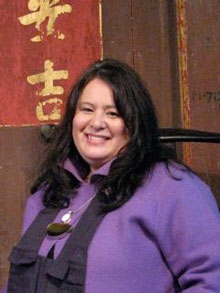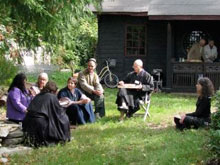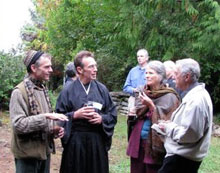
Prof. Paula Arai of Louisiana State University led this year's Vashon Seminar on Buddhism.

Vashon Buddhist Seminar: The Uses of Ritual
How do rituals work in our lives? How do rituals work in Buddhism? What is the connection between Buddhist “practice” and “ritual”?
Those attending the 5th Annual Vashon Seminar on Buddhism had the opportunity to explore these questions with presenter and facilitator Professor Paula Arai of Louisiana State University. For over ten years, Professor Arai has studied the lives of laywomen and nuns in the Zen communities of Japan. The title of this year’s seminar, sponsored by Puget Sound Zen Center and co-sponsored by the Northwest Dharma Association and Tricycle magazine, was that of Arai’s forthcoming book, “Living Zen: Gratitude, Empowerment, and Healing.” The day-long event took place September 21 on Vashon Island, Washington.
In her presentation, Professor Arai described how the Japanese women she has come to know use Buddhist ritual in their everyday lives. Nuns, for instance, practice a ritual of gratitude towards Ananda, the Buddha’s companion who argued the case for the ordination of women. Though of relatively low status in the Japanese Zen hierarchy, the nuns benefit from the empowering and ennobling features of this ritual.

Creating personal shrines and rituals was the topic for afternoon discussion groups. At center, Puget Sound Zen Center teacher, Koshin Cain.
Arai went on to describe the nature and role of ritual in the lives of laywomen. Many rituals, she said, have been improvised by the women themselves rather than handed down from on high by the (male) Zen hierarchy. They incorporate traditional recitations and practices, but are customized to the particular lives of the individuals who use them. Laywomen engage in these practices at their own home altars/shrines (butsudan in Japanese). Professor Arai titled this “Domestic Zen” and emphasized the healing role such rituals play in life. This “way of healing” occurs by engendering positive qualities for the person using it. Some of the qualities she noted are: experiencing interrelatedness, non-dualism (mind/body connection), self-nurturing, enjoying life, creating beauty, cultivating gratitude, developing acceptance, and living compassion.
Though her emphasis was on Japanese women in the Zen tradition, Arai believes the same thing can be seen in the lives of lay practitioners, especially women, throughout the Buddhist world in Asia: the translation of sophisticated, institutionalized Buddhist clerical activities into a pragmatic and immediate usefulness for ordinary family-based Buddhists.

David Smith, left, hosted the Seminar at his home on Vashon Island.
In the afternoon, those in attendance formed groups and shared ideas about developing rituals and places for them. In setting the stage for this work, Professor Arai urged participants to develop shrines and rituals meaningful to their own lives and cultures rather than adopting what may be only relevant in theory or intellectually.
In both the morning presentation, which had an academic cast, and in leading the individual, small and large group work in the afternoon, Professor Arai blended intellectual awareness and analysis with a deeply heart-felt sense of her own life and the lives of the women with whom she has lived and studied.
The afternoon’s work encouraged a good deal of lively and engaged discussion and gave people from various traditions, lineages, and sanghas the opportunity to learn from one another. The participants left with new ideas for incorporating shrines and rituals into their lives.
In introducing the day, Koshin Cain, resident teacher of Puget Sound Zen Center, explained that the annual seminars originated as a means to unite practice with study. The objective is to create a bridge between academia and living Dharma, to bring scholars down from the “ivory tower” while enriching the intellectual understanding of non-academic practitioners.
This fifth seminar, which joined practice, study, and ritual, went beyond even that aspiration. The beautiful bucolic setting, the warmth of the gathering, and the depth of Professor Arai’s presentation and work with the community created a wonderful and inspiring experience.
For more information about Puget Sound Zen Center, please visit www.pszc.org.
Contributor: Timothy O’Brien.
Photos: Kajira Wyn Berry.